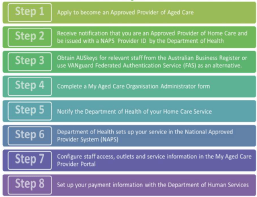- Research the regulatory requirements for home care businesses.
- Create a business plan outlining your services, target market, and financial projections.
- Register your business and obtain necessary licenses and permits.
- Develop operational policies and procedures for your home care services.
- Hire and train qualified caregivers.
- Market your services and build relationships with referral sources.
Are you interested in starting a private home care business in Australia? Look no further! This is the ultimate guide to get you started.
Starting a home care business is not only rewarding but also allows you to make a positive impact on people’s lives.
Whether you’re passionate about providing quality care or looking for a business opportunity, we’ve got you covered!

How to Start a Private Home Care Business in Australia
Starting a private home care business in Australia can be a rewarding venture that allows you to make a difference in the lives of individuals needing assistance in their own homes. However, it’s important to understand the necessary steps and considerations involved in setting up and successfully running a private home care business. In this article, we will explore the key aspects of starting a private home care business in Australia, including legal requirements, business planning, staffing, marketing, and more.
Understanding the Market and Legal Requirements
Australia’s aging population has created a growing demand for home care services. Before starting your private home care business, it is essential to research the market and understand the legal requirements involved.
Market Research:
Begin by evaluating the demand for home care services in your target area. Identify the demographic trends, the existing competition, and the specific needs of potential clients. This information will help you develop a unique selling proposition and tailor your services to meet the specific needs of your target market.
Legal Requirements:
Operating a private home care business in Australia requires compliance with various legal regulations. You will need to register your business, obtain the necessary licenses, and ensure compliance with industry standards and guidelines. Additionally, it is crucial to familiarize yourself with employment laws, health and safety regulations, and privacy requirements that apply to your business.
Developing Your Business Plan
Creating a comprehensive business plan is a crucial step when starting a private home care business in Australia. A well-structured business plan will help you outline your goals, strategies, and financial projections, setting a solid foundation for your business.
Identify Your Target Market:
Define your target market based on the research conducted in the previous step. Determine the types of services you will offer, such as personal care, companionship, or respite care, and identify the specific demographics and needs of your target clients.
Financial Projections:
Develop a financial forecast that includes startup costs, ongoing expenses, and revenue projections. Consider factors like staffing expenses, insurance costs, marketing and advertising budgets, and any necessary equipment or supplies.
Marketing and Branding:
Your business plan should also outline your marketing and branding strategies. Determine how you will promote your services and reach your target audience. Consider online platforms, social media, local advertising, and partnerships with healthcare providers or community organizations.
Staffing and Training
Building a qualified and compassionate team is vital for the success of your private home care business. It is important to carefully recruit and train caregivers who can provide excellent care to your clients.
Recruitment:
Develop a recruitment strategy to attract skilled and reliable caregivers. Utilize online job portals, local advertisements, or partnerships with training institutions to find potential candidates. Screen applicants thoroughly, conduct interviews, and check references to ensure the suitability of each candidate.
Training and Development:
Provide comprehensive training to your caregivers to ensure they possess the necessary skills and knowledge to deliver quality care. Offer ongoing professional development opportunities to enhance their expertise and keep up with industry best practices.
Creating a Safe and Supportive Environment
Creating a safe and supportive environment is crucial in the private home care industry. It is essential to establish policies and procedures that prioritize the safety and well-being of both your clients and your staff.
Health and Safety:
Develop comprehensive health and safety policies that comply with relevant regulations. Ensure your staff receives appropriate training in infection control, manual handling, and emergency procedures. Implement protocols for risk assessment and incident reporting to maintain a safe environment.
Client-Centered Care:
Focus on delivering personalized and client-centered care by involving your clients and their families in the care planning process. Regularly assess and evaluate the care provided to ensure it meets the unique needs and preferences of each client.
Marketing and Networking to Grow Your Business
In the competitive field of private home care, effective marketing and networking are essential to attract clients and grow your business.
Digital Marketing:
Create a professional website that highlights your services, expertise, and testimonials from satisfied clients. Use search engine optimization techniques to improve your online visibility and drive traffic to your website. Leverage social media platforms to engage with potential clients and provide valuable information on home care services.
Networking:
Network with healthcare professionals, senior care organizations, and community groups to establish partnerships and referrals. Attend industry conferences and events to connect with potential clients and other professionals in the home care industry.
Providing Quality Care and Building Trust
Delivering high-quality care and building trust with your clients and their families is essential for the success and reputation of your private home care business.
Continuous Quality Improvement:
Regularly assess and evaluate your services to identify areas for improvement. Seek feedback from clients and their families to ensure their satisfaction and make necessary adjustments to enhance the overall care experience.
Building Trust:
Establish open and transparent communication with your clients and their families. Build rapport by demonstrating empathy, reliability, and professionalism. Respect confidentiality and privacy and always prioritize the best interests of your clients.
Statistics on Home Care in Australia
According to the Australian Bureau of Statistics, the demand for home care services in Australia is steadily increasing. In 2020, there were approximately 1.3 million people receiving home care, representing a 10% increase from the previous year. This trend is expected to continue as the aging population grows, highlighting the potential for growth and success in the private home care industry in Australia.
In conclusion, starting a private home care business in Australia requires careful planning, knowledge of legal requirements, effective marketing strategies, and a commitment to delivering high-quality care. By understanding the market, developing a comprehensive business plan, building a qualified team, creating a safe environment, and implementing effective marketing and networking strategies, you can establish a successful home care business that makes a positive impact in the lives of those needing care in their own homes.
Frequently Asked Questions
Welcome to our FAQ section where you can find answers to common questions about starting a business from home in Australia.
How can I start a business from home in Australia?
If you are interested in starting a business from the comfort of your home in Australia, there are several steps you can take to get started. First, you need to develop your business idea. Think about what products or services you want to offer and how they align with the market demand. Then, write a comprehensive business plan that outlines your goals, target audience, competition, and marketing strategy. Additionally, creating a financial plan will help you determine your startup costs and projected income. Next, you should decide on a suitable name for your business and choose the right legal structure and entity. Registering and licensing your business is essential to ensure compliance with local regulations. Setting up a dedicated home office space will provide a professional environment for your operations. Implementing a small business accounting system will help you keep track of your finances effectively. Finally, develop a marketing plan to promote your business and attract customers.
How to start a home care business UK?
To start a home care business in the UK, there are several important steps to take. First, registration is required with the appropriate regulatory bodies such as the CQC, Care Inspectorate, or CIW for both the agency itself and the Registered Manager. Once registered, the business structure needs to be established, whether it be as a sole trader, limited company, or partnership. Insurance is essential to protect the business and its clients. Tendering for contracts is also necessary to gain clients and secure funding. Recruitment, induction, and training of staff are crucial to ensure the provision of high-quality care. Effective marketing strategies will be needed to promote the business and attract clients. Managing pay and VAT obligations is important for financial stability. Lastly, obtaining Disclosure Barring Service checks for staff members will foster confidence and trust in the business.
Can a foreigner start a small business in Australia?
Yes, foreigners can start a small business in Australia, but they will need to obtain a specific work visa in order to do so. It is important for non-citizens who wish to start and run a business in Australia to understand the necessary steps to obtain the appropriate visa and their obligations as business owners. Knowing which visa is needed is essential in order to begin the process of starting a business in Australia as a foreigner.
Can a non resident own a business in Australia?
Yes, a non-resident can establish a business in Australia, but they are not allowed to do it independently. According to Australian regulations, every company must have at least one director who is a resident of Australia. For public companies, at least two out of the minimum three directors must be Australian residents. While non-residents have the opportunity to start a business in Australia, they must adhere to these requirements by having a local resident involved in the company’s directorship.
How To Start A Home Care Agency | Episode 1 – Getting Started 7 Key Steps
Summary
Starting a private home care business in Australia is possible for anyone who is passionate about helping others. It involves understanding the legal requirements, creating a business plan, and finding reliable staff.
By following these steps, you can provide quality care to those in need, while also running a successful business. Remember to prioritize training, marketing, and building strong relationships with clients and their families. With dedication and hard work, you can make a positive impact in the lives of those who rely on your services.

